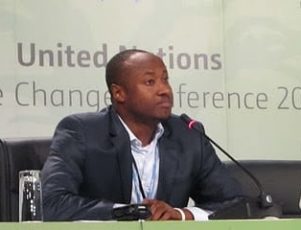By Sheldon Mayer, Managing Editor
In preparation for the 21st United Nations Climate Change Conference (COP21) to be held in Paris in early December, the African Group representative, Seyni Nafo, is readying the hard line he will take with the need to balance Africa’s development and to reduce the horrific impacts of climate change upon the continent.
Mr. Nafo, of Mali, will be representing the 54-country continent in UN negotiations in the UN Framework on Convention on Climate Change (UNFCCC), a multilateral treaty signed in 1992. The 34-year-old Nafo has said that “it’s a positive agenda. It will bring concrete initiatives, not just statements but ambitious initiatives,” an issue that is always of concern in UN treaties due the unenforceable nature of most documents.
Seyni Nafo: There and Back Again
A position of influence is not new to Nafo, the son of an international banker who held lofty positions, including with the African Development Bank. Even with four siblings including a twin, Nafo’s voice was always heard. As Nafo and his family dutifully followed his father, Nafo rubbed shoulders with the elite, particularly during his time at Lycée Saint-Martin-de-France in Pontoise. Run by the Congregation of the Oratory, Nafo said that the Lycée Saint Martin was “not necessarily a school of excellence, but a school of bourgeois or aristocrats,” which built his character and formed the foundation for the strong leader he is today.
Representing nearly 1 billion people in Africa’s struggle to maintain development in the face of carbon emission reductions takes a certain kind of leader: according to Alix Mazounie of the Climate Action Network, Nafo has the necessary “x-factor.” “[Nafo] has a real ability to negotiate with developed countries, and encourage them to do more for Africa…he prefers realistic commitments rather than aberrant figures,” both of which are integral qualities when dealing with the at times glacial UN body.
Before he arrived at the peak of African climate negotiations, Nafo spent a great deal of time abroad. After completing his studies, he worked as a trader in Chicago and learned the ropes of high-powered finance in the world’s carbon emission leader. After returning to Mali 27 years ago, Nafo’s view on climate change sharply focused—“we have no choice,” he said, but to turn to renewables.
A Breath of Fresh Air
While he continues to work as a trader in the African market, he is acutely conscious of the vast differences in his current (albeit officially unknown) income and his potential income were he a hedge fund manager in the United States. The fact that he knows the opportunities available to him and yet remains in his current position as Africa’s climate change forerunner shows his true character. By using his knowledge of international markets, he has embraced the challenges of representing a continent that has relatively little sway in terms of negotiating climate deals but that bears the brunt of the negative effects of climate change.
Nafo’s comments are usually population-centric, and mean to bring attention to Africa’s particularly difficult position. During a 2012 conference, Nafo issued a firm response to US climate envoy Todd Stern, saying that “Africa is at the forefront of climate impacts; science shows that temperatures [have risen] approximately 150% more than the global average…that means the destruction of crops on a huge scale…crops [that] belong to subsistence farmers and the result is devastation and famine. This is not a game with numbers; it’s a question of people’s lives.”
Keeping Development Alive In Hostile Climate
Nafo knows that sacrificing development in order to reduceAfrica’s relatively low emissions would have would have catastrophic implications. He is a strong proponent of clean energy because it provides an opportunity to maintain development while lowering emissions. “Not only Africa is the region that has the least amount of greenhouse gas emissions and which is the most vulnerable,” says Nafo, “but it is also the region with the greatest potential for renewable energy and the one with the lowest rate of current energy access.” For Nafo, clean energy is the safest, fastest and surest way to develop the continent. While his commitment to clean energy is not purely a commitment to bluer waters and cleaner skies, it shows a deep understanding of Africa’s bargaining power.
A Fair Shot
For Africa, reducing the impacts of climate change is anything but a game. The summit provides an ideal platform to push their development plans as climate-friendly: Africa has borne the brunt of climate change’s negative impacts despite contributing only 3% of the world’s carbon emissions, according to Nafo. The African continent has been crippled by drought and famine, plagued by seemingly endless civil war, and is now at the mercy of the world’s largest emission offenders.
Africa has not had the same pattern of development as the majority of the world: crippled by Western imperialism and colonialism, as well as today’s mismanagement of assets, internal struggles and external pressures, Africa needs a chance to develop before its industry can be curtailed. A continent with nearly 1/7th of the world’s population and only 3% of its global emissions should not be held responsible for change. It is irresponsible of global leaders to suggest that Africa limit itself in the same way as China or the United States. A realistic (meaning enforceable) plan should be developed that promotes sustainable energy sources without decimating Africa’s burgeoning industrial sector.

